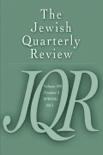
JEWISH QUARTERLY REVIEW
Scope & Guideline
Navigating the Complexities of Jewish History and Culture
Introduction
Aims and Scopes
- Interdisciplinary Jewish Studies:
The journal encompasses a wide range of disciplines including history, literature, philosophy, and sociology, fostering interdisciplinary dialogue and scholarship within Jewish Studies. - Historical Contextualization:
Papers often focus on the historical context of Jewish texts and phenomena, examining their development and impact within broader social, political, and cultural frameworks. - Cultural and Religious Analysis:
The journal explores the complexities of Jewish culture and religion, analyzing texts and practices from various historical periods, including medieval, modern, and contemporary contexts. - Focus on Minority Perspectives:
It emphasizes the exploration of Jewish minority experiences, particularly in relation to broader societal dynamics, such as colonialism, nationalism, and diaspora. - Engagement with Contemporary Issues:
The journal also addresses contemporary Jewish issues, bridging historical scholarship with current debates in Jewish identity, politics, and culture.
Trending and Emerging
- Intersections of Jewish Identity and Politics:
Recent publications have increasingly focused on the intersections between Jewish identity and political discourse, particularly in the context of nationalism, Zionism, and diaspora politics. - Cultural Memory and Holocaust Studies:
There is a growing emphasis on exploring cultural memory and representations of the Holocaust, reflecting a renewed interest in how these narratives shape contemporary Jewish identity and historical consciousness. - Global Perspectives on Jewish Culture:
The journal is increasingly publishing works that examine Jewish culture in a global context, highlighting transnational connections and the experiences of Jews outside of traditional centers. - Gender Studies in Jewish Contexts:
Emerging themes in gender studies are gaining traction, with a focus on the roles and representations of women in Jewish history, literature, and religious life. - Interdisciplinary Approaches to Jewish Mysticism and Kabbalah:
There is a notable trend towards interdisciplinary studies of Jewish mysticism and Kabbalah, integrating insights from psychology, philosophy, and cultural studies to explore their relevance in contemporary discourse.
Declining or Waning
- Traditional Textual Studies:
There has been a noticeable decline in traditional textual analysis of classical Jewish texts, such as the Talmud or medieval philosophical writings, as scholars increasingly focus on contemporary applications and interdisciplinary approaches. - Focus on Eastern European Jewish Studies:
Although historically significant, the emphasis on Eastern European Jewish experiences and studies has diminished, possibly due to a broader interest in global Jewish narratives and the diversification of Jewish identities. - Historical Biographies of Prominent Figures:
The trend of publishing extensive biographical studies on well-known historical Jewish figures appears to be waning, as current scholarship shifts towards collective narratives and social history.
Similar Journals
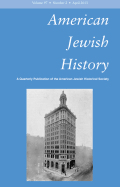
AMERICAN JEWISH HISTORY
Charting the Historical Journey of American JewsAMERICAN JEWISH HISTORY is a premier academic journal published by Johns Hopkins University Press, dedicated to the exploration and analysis of the Jewish experience in the American context. With ISSN 0164-0178 and E-ISSN 1086-3141, this journal serves as a vital resource for scholars and students in the fields of cultural studies, history, and religious studies, as evidenced by its placement in the Q3 quartile across these disciplines in 2023. Reaching a broad audience interested in the historical, social, and cultural dimensions of the American Jewish narrative, the journal has converged in various years, ensuring a robust collection of multidisciplinary research and discussions. Although it operates under a traditional subscription model, the journal remains an essential platform for critical analysis, fostering deeper understanding of Jewish identity and history. With Scopus rankings placing it at the 60th percentile in History and 62nd percentile in Religious Studies, AMERICAN JEWISH HISTORY stands as a respected publication that significantly contributes to the discourse surrounding Jewish history and culture in the United States.

Images
Unveiling the Power of Visual NarrativesImages, published by BRILL, serves as a significant academic platform within the realms of Cultural Studies, History, Religious Studies, and the Visual Arts and Performing Arts. With its ISSN 1871-7993 and E-ISSN 1871-8000, this journal is committed to providing a scholarly forum that engages with the complexities of visual representations and their impact on cultural narratives. Though it currently holds a Q4 category ranking across various fields, indicating room for growth, its presence in Scopus rankings showcases its contribution to the arts and humanities, positioning it as a unique voice in interdisciplinary discourse. The journal aims to publish innovative research that fosters dialogue among scholars, practitioners, and students interested in the intersections of visual culture and societal dynamics. Despite its non-open access status, Images remains a vital resource for those seeking to understand the intricate fabric of cultural expressions from historical and contemporary perspectives, offering insights that resonate across academic and artistic landscapes.
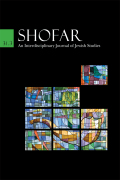
Shofar-An Interdisciplinary Journal of Jewish Studies
Illuminating Jewish Studies with Scholarly ExcellenceShofar: An Interdisciplinary Journal of Jewish Studies, published by Purdue University Press, is a prominent peer-reviewed journal that engages with the diverse and rich tapestry of Jewish studies through interdisciplinary approaches. With a focus on cultural studies, history, and religious studies, the journal has established itself within the academic community, achieving significant recognition evidenced by its Q3 ranking in these disciplines as of 2023. Researchers and scholars in the field will find valuable insights and innovative discussions that push the boundaries of traditional scholarship. Though currently not open access, Shofar offers an enriching forum for scholarly discourse that fosters a deeper understanding of Jewish identity, history, and culture, making it an essential resource for professionals and students alike. The journal's ISSN is 0882-8539, while its E-ISSN is 1534-5165. It is operational from 2014 to 2024 and is located in the United States.
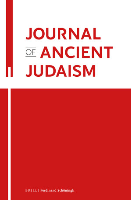
Journal of Ancient Judaism
Illuminating the Cultural Contexts of Ancient JudaismThe Journal of Ancient Judaism is an esteemed academic publication focusing on the dynamic field of religious studies, particularly the historical and cultural contexts of ancient Judaism. Published by BRILL, a reputable international publisher known for its scholarly contributions, this journal is dedicated to advancing the study of ancient Jewish texts, traditions, and their socio-political environments. With an ISSN of 1869-3296 and an E-ISSN of 2196-7954, the journal has established its footprint in the scholarly community, supported by its ranking in the Q3 quartile for Religious Studies in 2023 and a Scopus rank of #371 out of 644 in its category. The content showcased in this journal is vital for researchers, professionals, and students alike, offering peer-reviewed articles that contribute to the broader understanding and appreciation of ancient Jewish heritage and its influence on contemporary religious thought. With a timeline spanning from 2015 to 2024, the journal aims to facilitate rigorous academic discourse and provide open access to vital research findings, fostering a deeper engagement with the complexities of ancient Judaism.
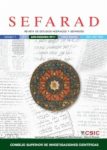
SEFARAD
Bridging Disciplines to Uncover Hidden NarrativesSEFARAD, published by the CONSEJO SUPERIOR INVESTIGACIONES CIENTIFICAS-CSIC, is a renowned open-access journal that has been a pivotal platform for scholarly communication since its inception in 1996. Based in Spain, it caters to a diverse readership across multiple disciplines, including Cultural Studies, History, Literature and Literary Theory, Religious Studies, and Linguistics and Language. The journal has successfully established itself within respected academic circles, achieving Q2 rankings in both History and Literature and Literary Theory as per the 2023 category quartiles, emphasizing its significance in these fields. With a commitment to fostering interdisciplinary dialogue and enhancing understanding of the Jewish heritage and culture in the Iberian Peninsula, SEFARAD presents original research articles, comprehensive reviews, and critical essays that inspire further scholarly inquiry. Researchers, professionals, and students alike will find this journal an invaluable resource for contemporary studies in its vibrant subject areas.

JEWISH SOCIAL STUDIES
Exploring the rich tapestry of Jewish life and culture.Jewish Social Studies is a prominent peer-reviewed journal published by Indiana University Press, dedicated to advancing the field of Jewish scholarship through interdisciplinary exploration and critical inquiry. With an ISSN of 0021-6704 and an E-ISSN of 1527-2028, this journal has become a vital resource for researchers and scholars, achieving Q2 rankings in both History and Religious Studies, as well as strong standings in Anthropology and Cultural Studies. The journal bridges the gaps between diverse academic disciplines, focusing on the multifaceted dimensions of Jewish life, culture, and history, making it essential reading for anyone engaged in the study of Judaism. Although it does not currently offer Open Access options, the journal promotes a wealth of rigorous research, critical perspectives, and in-depth analyses that contribute significantly to the understanding of Jewish Studies from 1975 to the present day, with ongoing issues scheduled until 2024. With an established audience of scholars, professionals, and students, Jewish Social Studies remains a leading platform for intellectual discourse and scholarly exchange in the humanities.

Judaica Bohemiae
Illuminating Jewish Identity Through Scholarly InquiryJudaica Bohemiae, published by the Zidovske Muzeum Praze, is a prominent scholarly journal dedicated to the study of Jewish culture, history, and religious practices, with a particular focus on the Czech Republic and Central Europe. Since its relaunch in 2007, the journal has established itself as a valuable resource in the fields of Cultural Studies, History, and Religious Studies, achieving a commendable Q2 ranking across these disciplines in 2023. With its thoughtful compilation of research articles and critical essays, Judaica Bohemiae offers insights into the evolving dynamics of Jewish existence and identity. Although it does not currently operate under an open access model, the journal ensures that its high-quality content remains accessible to researchers, professionals, and students interested in the nuanced intersections of culture and history. By promoting rigorous academic discourse and advancing the understanding of Jewish heritage, Judaica Bohemiae continues to play a crucial role in its field, fostering scholarly connections and illuminating the past for future generations.
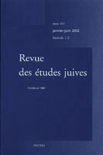
REVUE DES ETUDES JUIVES
Nurturing Emerging Voices in Jewish Cultural DiscourseREVUE DES ETUDES JUIVES, published by PEETERS, stands as a vital platform for scholarly discourse in the realms of Cultural Studies, History, Literature and Literary Theory, and Religious Studies. Based in Belgium, this journal, bearing the ISSN 0484-8616 and E-ISSN 1783-175X, has been faithfully chronicling research since its inception, with comprehensive coverage spanning from 1967, 1969, and several periods thereafter until 2023. Although categorized in Q4 quartiles across its fields—showing a diverse yet niche presence—it provides an invaluable space for emerging voices and established scholars to explore Jewish studies in a multidisciplinary context. Despite its compact impact factor and Scopus rankings reflecting its emerging status in the academic community, the journal is committed to fostering dialogue on the cultural and historical aspects of Jewish identity, offering a unique opportunity for researchers, professionals, and students to engage with contemporary and historical issues of Jewish significance. As a non-open access resource, it appeals to those seeking rigorous academic inquiry supported by Peeters' esteemed publishing acumen.
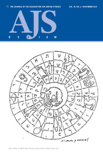
AJS Review-The Journal of the Association for Jewish Studies
Cultivating a Global Dialogue on Jewish Heritage and ScholarshipAJS Review - The Journal of the Association for Jewish Studies is a leading academic journal published by the University of Pennsylvania Press, dedicated to advancing scholarship in Jewish studies. With its ISSN 0364-0094 and E-ISSN 1475-4541, the journal offers a rich compendium of research from various disciplines, including cultural studies, history, literature and literary theory, and religious studies. Recognized within the Q2 and Q3 quartiles across multiple categories in 2023, AJS Review provides an esteemed platform for academics to disseminate innovative ideas and engage with critical issues relevant to Jewish history and culture from 1976 to 2024. Although not an open-access journal, it ensures that high-quality, peer-reviewed articles are available to a global audience, enabling researchers, professionals, and students to foster deeper insights into Jewish narratives and heritage. By promoting interdisciplinary dialogue, AJS Review is integral to the academic community, offering valuable contributions to our understanding of Jewish studies and its broader implications.

Nordisk Judaistik-Scandinavian Jewish Studies
Advancing Scholarship on Jewish Culture and History in the NorthNordisk Judaistik-Scandinavian Jewish Studies is a distinguished academic journal dedicated to the exploration of Jewish culture, history, and religious practices in the Scandinavian context. Published by the DONNER INSTITUTE FOR RESEARCH ON RELIGIOUS AND CULTURAL HISTORY in Finland, this journal has been an open access platform since 2016, allowing easy dissemination of knowledge and fostering scholarly communication among researchers, educators, and students. With a variety of subjects encompassing Anthropology, Cultural Studies, History, and Religious Studies, the journal has achieved commendable recognition, with its latest rankings placing it in Q2 in several categories according to the 2023 Scopus rankings. The journal's significant contribution to the field is evident through its impact, evidenced by its strategic position within its respective quartiles. By bridging interdisciplinary methodologies and Jewish studies within a Scandinavian framework, Nordisk Judaistik serves as an essential resource for those engaged in the complexities and nuances of Jewish heritage and identity in the region.